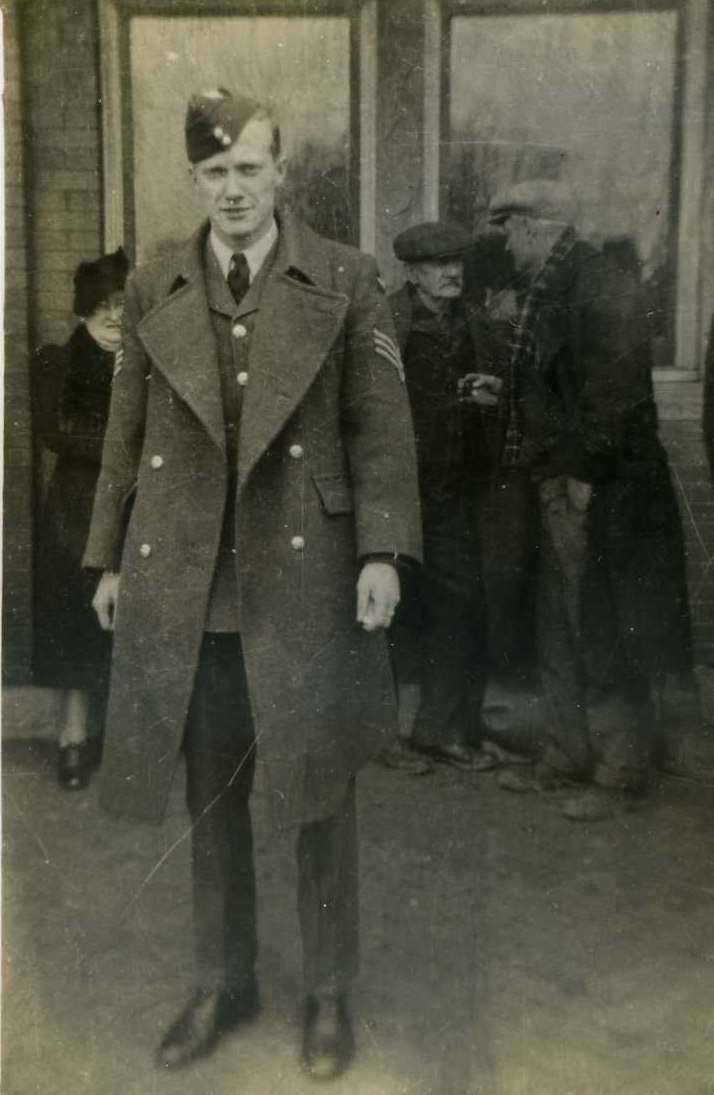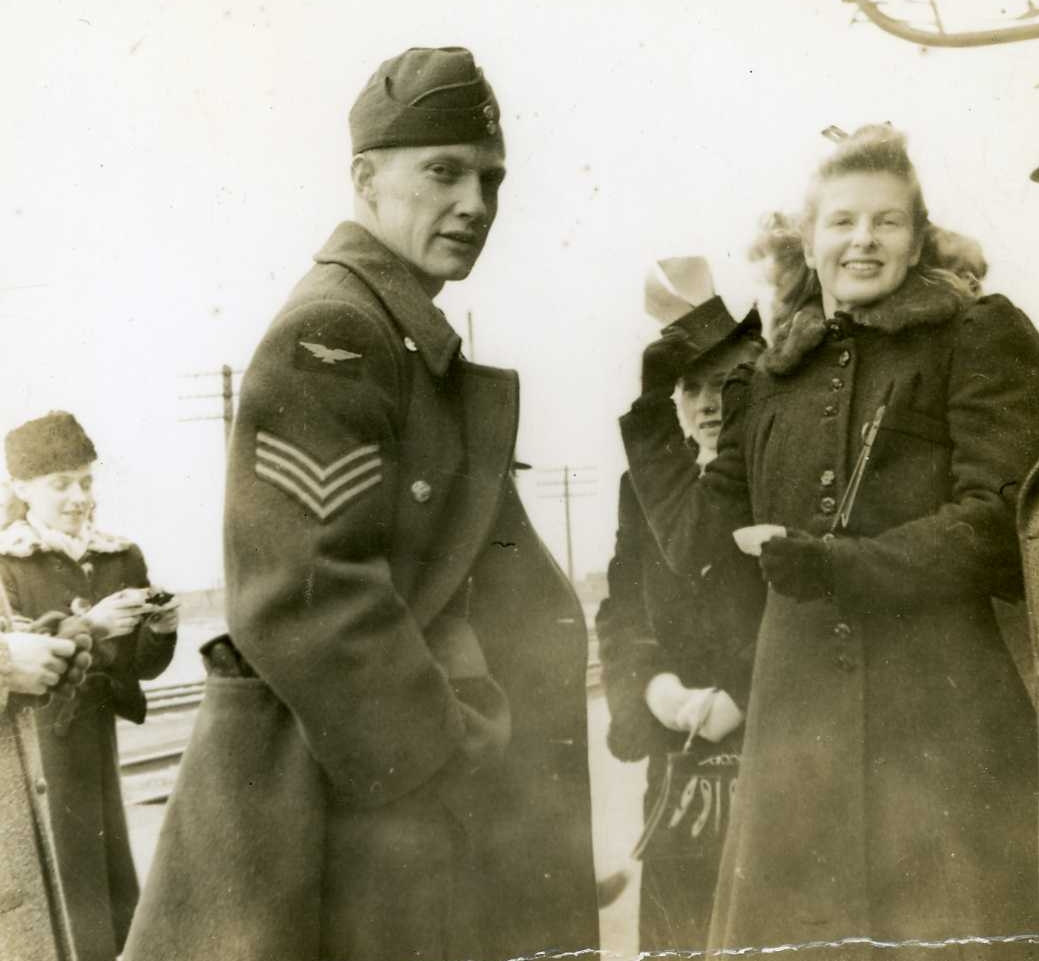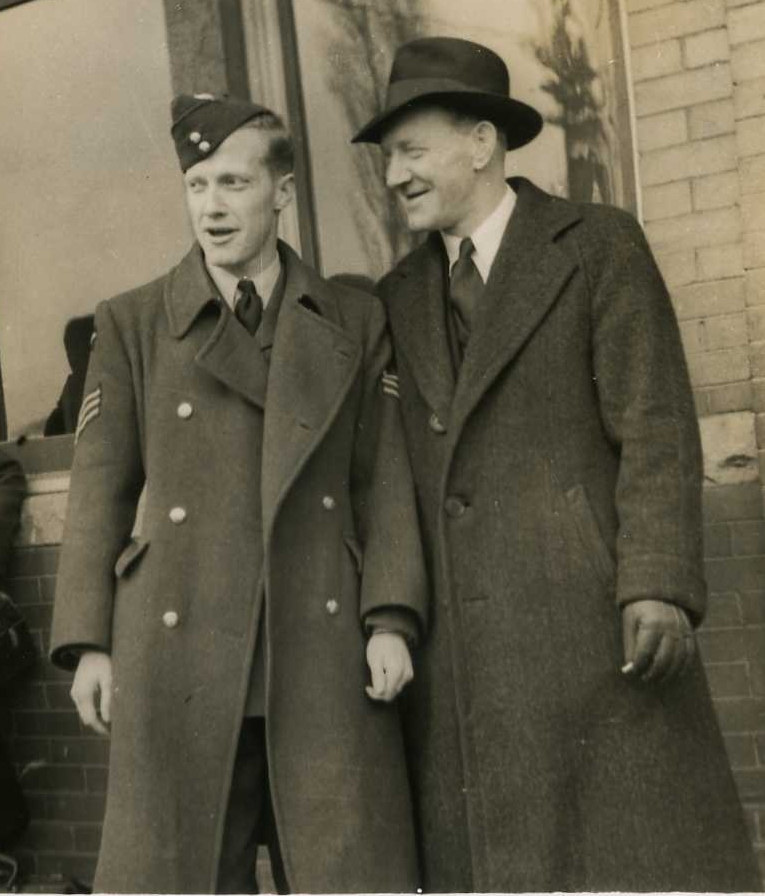The Glasgow born Welland Ontario native travelled the short distance to the RCAF Recruiting Center in Niagara Falls on June 24th 1940. Michael would be the second of his family to enlist. His brother James was already overseas with the Canadian Army Signal Corp. Michaelís father John looked after the two boys, it had been a close all male family since the passing of Michael's mother when he was a child.
The Making of an Airmen
It would not be long before he completed a slightly longer journey to No.1 Manning Depot in Toronto. The Canadian National Exhibition grounds were the Manning Depots parade grounds and the buildings of the C.N.E. including the "Horse Palace" were the barracks for many RCAF recruits, a good number of which who would later be part of 419 Squadron.
Although Toronto was close to his Welland home, his next posting would take him half way across Canada to No.2 I.T.S. in Regina. Initial Training School provided the RCAF with the opportunity to test the new recruits and put them through a series of evaluations and psychological exams. The test results determined which trade the RCAF thought would be best suited for him.
During this month and half at I.T.S. the selection process showed he had abilities for both the Air Gunner position which is what he had requested on enlistment as well as a Wireless Operator.
His next step was to travel back East again, this time to No.1 Wireless School in Montreal. With his months of training in Montreal on the operation, principals and theory of radios now completed he would now return to Ontario.
His posting to No. 1 Bomb and Gunnery School at Jarvis Ontario brought him close to his Niagara Peninsula home town of Welland. Being this close would have given him the opportunity to visit with his father.
Overseas and More Training



The long farewells at the local station to family and those you hope to come home to.
A train ride and a crossing of the dangerous Atlantic, another train ride to the world of war time Bournemouth.
A short settling in time at No.3 Reception Center,would bring the Sergeant into war time life of rationing, air raids and blackouts. The RAF had it's own training system in place and airmen trained in Canada were often placed into the RAF system and so Sgt. McAroy would once again attend Wireless training, this time at RAF Yatesbury.
After two and half months at No. 2 Radio School it was time to join an aircrew and prepare for life on an airbase.
No. 23 O.T.U. would see the new Wireless Operator/ Air Gunner crew up for Wellington night bombing training. No mention if he continued with the same crew while at 75 Squadron. His official movement cards conflict with where he was posted and in which order. One set shows he was posted from O.T.U. to No.99 Squadron, then eleven days later No.75 Squadron then back again to No.99. Then the same day going from No.99 to No.75 New Zealand Squadron.
The second movement card, the one which is likely correct has him first at No.99 Squadron then eleven days later to No.75 Squadron.
He did arrive at 419 on the 26th of March 1942. And would soon fly operations as part of F/S Shannon's crew.
Sgt. McAroy was by this time a well experienced airmen. By December 11th. 1941 he had completed half the sorties needed complete his Tour.
The Shannon Crew
His March 26th arrival at 419 provided McAroy with a couple of days to become acquainted with his new crew.
The crew was comprised of:
F/S Charles Shannon Pilot
P/O Morris 2nd. Pilot later replaced by F/S John King
Sgt. Alfred McCoy Navigator
Sgt. Howard Hibbard Wireless Op.
Sgt. Michael McAroy Wireless Op. /Air Gunner
Sgt. Henry Went Air Gunner
They flew X3703 exclusively through their nine operations
A Letter to Home
His operations with Shannon did have a few incidents, lost hydraulics on one Gardening operation and one in which he and the others in the crew experienced a "severe loss of oxygen".
It is impossible for anyone other then those who flew the missions to express to others what went on during these operations over enemy territory. In a letter to his father Sgt. McAroy did express what went on during those sorties over Germany. I feel he played down the dangers involved for the sake of his father now at home alone with two sons in the service. A section of a letter home describing an eight or nine hour sortie to Berlin or Hamburg was published in the local paper. Parts of which could have been censored by the press or before his father received the letter.
"It seems longer than that, particularly coming home. We took off at dusk, reach the other coast when it is dark.
First thing you see is the searchlights trying to pick you up.
We just laugh at this point on the trip. Sometimes the "flak" gets too close, but, its nothing yet. These places are well inland, and Jerry has taken over all the small countries, consequently they are defended. Everyone has their eyes peeled. Anything can happen.
The Navigator has a log. More searchlights. The skipper tosses the kite about, climbing and weaving so the Jerry lights can't hold us. One of us spots the master searchlight. Jerry is hot with his lights.
Finally, we are through the lights. Thank God!
Now it is open country, with a few scattered clouds. By golly! it's cold. We are at 18,500 feet up. The navigator goes down and fuses the bombs, a sign of the plane nearing the target. We watch for the bend in the river or for different landmarks.
Hey Mike, can you see anything? -- "not yet"...."OK!" Then the rear gunner sights a river to starboard. The fun begins. Old Jerry is waiting , we know. We start the run-in, and begin to see the outline of a town. Yes;...it's all right.
The navigator is lying on his stomach all set to press the button. He gets his sights all set - - its tense, honestly the thoughts that run through your head. Bang !
Jerry is starting. What a barrage! All around the kite puffs of smoke. Jerry has us, and we are not in yet,
Drop those bombs, Sid for God's sake- hold on a minute. Is going to open the bomb doors. Next moment bombs are gone, and Jerry still pounding us.
"Now for more weaving in the sky. G is the master at this. He just laughs. he is the coolest chap I've ever seen in a tight spot.
He also writes philosophically.
It's the old, old story, you either get it or you don't. I am firm believer in fate but unfortunately there are many who do not share my ideas. So, Dad all I can say is, it is God's will I have done what I have done and if I am to continue, well, I just will."
We just laugh at this point on the trip. Sometimes the "flak" gets too close, but, its nothing yet. These places are well inland, and Jerry has taken over all the small countries, consequently they are defended. Everyone has their eyes peeled. Anything can happen.
The Navigator has a log. More searchlights. The skipper tosses the kite about, climbing and weaving so the Jerry lights can't hold us. One of us spots the master searchlight. Jerry is hot with his lights.
Finally, we are through the lights. Thank God!
Now it is open country, with a few scattered clouds. By golly! it's cold. We are at 18,500 feet up. The navigator goes down and fuses the bombs, a sign of the plane nearing the target. We watch for the bend in the river or for different landmarks.
Hey Mike, can you see anything? -- "not yet"...."OK!" Then the rear gunner sights a river to starboard. The fun begins. Old Jerry is waiting , we know. We start the run-in, and begin to see the outline of a town. Yes;...it's all right.
The navigator is lying on his stomach all set to press the button. He gets his sights all set - - its tense, honestly the thoughts that run through your head. Bang !
Jerry is starting. What a barrage! All around the kite puffs of smoke. Jerry has us, and we are not in yet,
Drop those bombs, Sid for God's sake- hold on a minute. Is going to open the bomb doors. Next moment bombs are gone, and Jerry still pounding us.
"Now for more weaving in the sky. G is the master at this. He just laughs. he is the coolest chap I've ever seen in a tight spot.
He also writes philosophically.
It's the old, old story, you either get it or you don't. I am firm believer in fate but unfortunately there are many who do not share my ideas. So, Dad all I can say is, it is God's will I have done what I have done and if I am to continue, well, I just will."
May 8/9 1942 - Warnemunde
The complete story of what happened to F/S McAroy and the crew of Wellington X3703 is unknown except to those who were on X3703 that night. All that is known their original burial was at Neuer Friedhuf in Rostock. This leaves us to the conclusion that somewhere near that city their Wellington came down, by flak or night fighters.
A Father's Fight to See his Son's Grave
 John McAroy, Michael's father was very determined to visit his sons resting place in the Berlin War Cemetery.
Sometime at the end of July of 1948 the bodies of F/S McAroy and the other members of the crew had been re-interned
in the Berlin 1939 to 1945 Cemetery.
John McAroy, Michael's father was very determined to visit his sons resting place in the Berlin War Cemetery.
Sometime at the end of July of 1948 the bodies of F/S McAroy and the other members of the crew had been re-interned
in the Berlin 1939 to 1945 Cemetery.And John McAroy was fighting a battle against the red tape that was keeping him from going and seeing his son's grave site.
There are no family records of what or why the red tape was keeping him back. Although a look at the political climate and tension in Berlin at this time may give some indication.
The Soviets controlled the East side of Germany including all routes into Berlin. They stopped all traffic to the city and the only way to bring food to the devastated city was by air. From June 24th 1948 through to May of 1949, the Berlin Airlift brought in a steady flow of food and other essentials.
The city of Berlin itself was almost flattened by air attacks and the Russian Army advance through it. Almost every building was damaged, whole sections of the city were just rubble. Food was in short supply, everything was in short supply Black Market activities were everywhere. German money was worthless, cigarettes were the main currency next to bartering. Accommodations were few and getting around in 1948 Berlin was not easy. The authorities had their hands full looking after the people of Berlin and keeping control of the West side of Berlin. They most certainly did not need anyone else to watch over.
